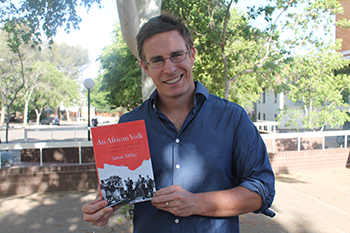Latest News Archive
Please select Category, Year, and then Month to display items
27 August 2019
|
Story Moeketsi Mogotsi
|
Photo Johan Roux
 Katleho Lechoo, newly elected SRC President on the Bloemfontein Campus and Sonawible Dwaba, outgoing SRC President.
Katleho Lechoo, newly elected SRC President on the Bloemfontein Campus and Sonawible Dwaba, outgoing SRC President.
The University of the Free State’s Student Representative Council (SRC) elections took place on the Bloemfontein,
Qwaqwa, and
South campuses during August.
The following candidates were successfully elected as 2019/2020 SRC members on our three respective campuses.
BLOEMFONTEIN CAMPUS SRC:President:Katleho Lechoo
Deputy President:Agobakwe Mboweni
Secretary:Nothabo Zungu
Treasurer:Zandile Makalima
Policy and Transformation:Kamohelo Thakheli
Student Development and First-Generation Students:Thobeka Buti
Commuter Students:Karabo Mtsweni
Associations Student Council:Mandilakhe Magalakanqa
Student Organisations Council:Dieketseng Motaung
Academic Student Council:Lebofsa Malete
Day Residence Council:Gert Terblanche
Campus Residence Council:Tyrone Willard
Postgraduate Student Council:Mahlomola Khasemene
International Student Council:Simba Matem
Student Media and Dialogue Council:Karabo Masike
Universal Access and Social Justice Council:Micaula Jewell
Civic and Social Responsibility Council:Nthato Musa
Arts and Culture Council:Motshidisi Rasego
Sports Council:Sphumelele Dube
QWAQWA CAMPUS SRC:President:Xolani Sandile Sibiya
Deputy President:Thembinkosi Phenyane
Secretary General:Nelisiwe Bridget Masango
Treasurer:Ntandoyenkosi Khumalo
Policy and Transformation:Bongiwe Nakile Khumalo
Student Development and First-Generation Students:Thokozani Siphiwe Zuma
Commuter Students:Thabiso Celimpilo Masuku
Media and Publicity:Simphiwe Sinenhlanhla Dube
Associations and Religious Affairs Student Council: Sicelo Mathews Twala
Campus Residence Council: Thabo Abraham Motaung
Arts and Culture Council:Andile Saviour Maseko
Academics Council:Siyabonga Mpumelelo Mbambo
Sports Council: Tshepiso Fortune Tshabalala
Universal Access and Social Justice Council: Siphamandla Joseph Shabangu
Postgraduate Student Council:Thato Karabo Moloi
International Student Council:Mamokete Mokhatla
SOUTH CAMPUS SRC:President: Phehellang Ralejoe
Deputy President:Nokubonga Mangaliso
Secretary:Mpumelelo Ndzube
Treasurer:Sithembiso Khoza
Policy and Transformation:Casles Phasha
Commuter Students:Sthembele Kunene
 Announcement of 2019/2020 SRC
Announcement of 2019/2020 SRC
 Kathelo Leechoo, SRC President, address the crowd
Kathelo Leechoo, SRC President, address the crowd
 First sitting of the newly elected SRC on the Bloemfontein Campys
First sitting of the newly elected SRC on the Bloemfontein Campys
 First sitting of the newly elected SRC on the Bloemfontein Campys
First sitting of the newly elected SRC on the Bloemfontein Campys
 Katleho Leechoo
Katleho Leechoo
 SRC results were announced on Monday 26 August 2019
SRC results were announced on Monday 26 August 2019
 Pura Mgolombane, Dean of Student Affairs
Pura Mgolombane, Dean of Student Affairs
 The new Student Representative Council for the Bloemfontein Campus
The new Student Representative Council for the Bloemfontein Campus
US author launches book at UFS on African volk
2016-10-17

Dr Jamie Miller, Postdoctoral Fellow at the
University of Pittsburgh and author of
An African Volk: The Apartheid Regime
and Its Search for Survival.
Photo: Rulanzen Martin
“I realised the importance of not just accessing the policies and political approaches of the leaders of the apartheid regime, but understanding the ideas and world views that informed them. Part of the solution to this was to learn Afrikaans.”
This is according to Dr Jamie Miller, a Postdoctoral Fellow at the University of Pittsburgh, on how he went about getting inside the mind of South Africa’s apartheid regime in order to complete his book, An African Volk: The Apartheid Regime and Its Search for Survival.
The book was launched on 11 October 2016 by the Archive for Contemporary Affairs at the University of the Free State on the Bloemfontein Campus.
Volk refers to the Afrikaner nationalist movement
The book is an ambitious new international history of 1970s apartheid South Africa. It is based on newly declassified documents and oral histories, the majority in Afrikaans, which focus on the regime’s attempts to turn the new political climate to its advantage.
The term volk refers to the Afrikaner nationalist movement, also known as Afrikanerdom. The story of Afrikaner nationalism was the medium through which the regime gained power.
Four main messages from the book
Dr Miller says there are four main messages for his readers. Firstly, the apartheid regime looked to contest and hijack new ideas and norms that formed the postcolonial world, and secondly, that we need to start thinking more seriously about the Cold War in terms of domestic politics, not just geopolitics.
Thirdly, South Africa should be integrated into histories of the global South, and lastly, we should conceptualise the apartheid regime by looking at it not just as an imperial holdover, but also by looking at what was happening in the world in the time period in question.